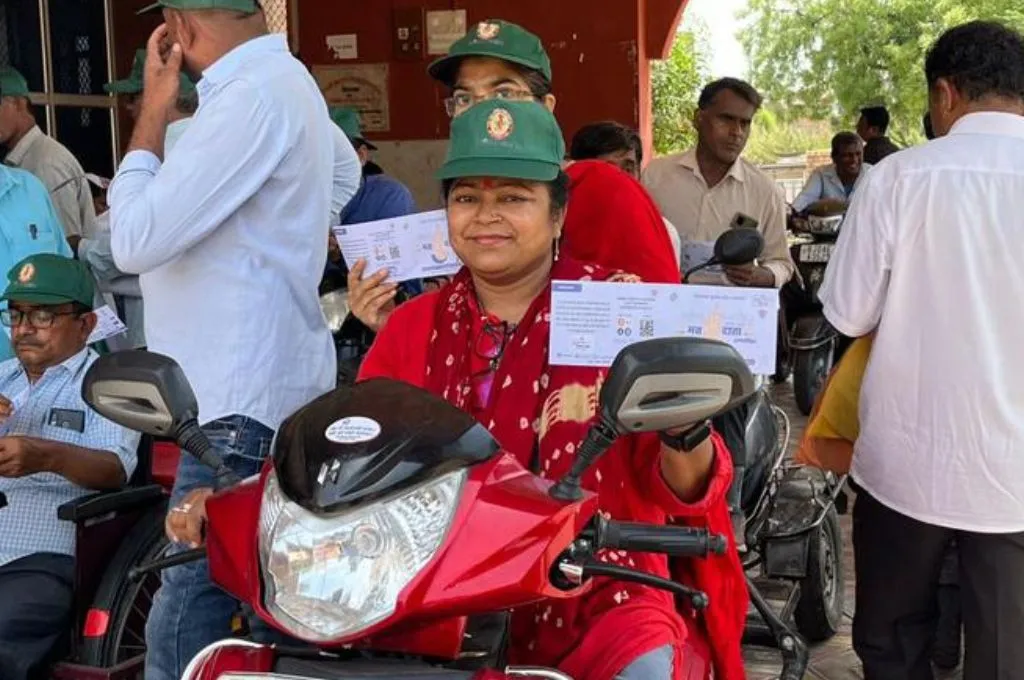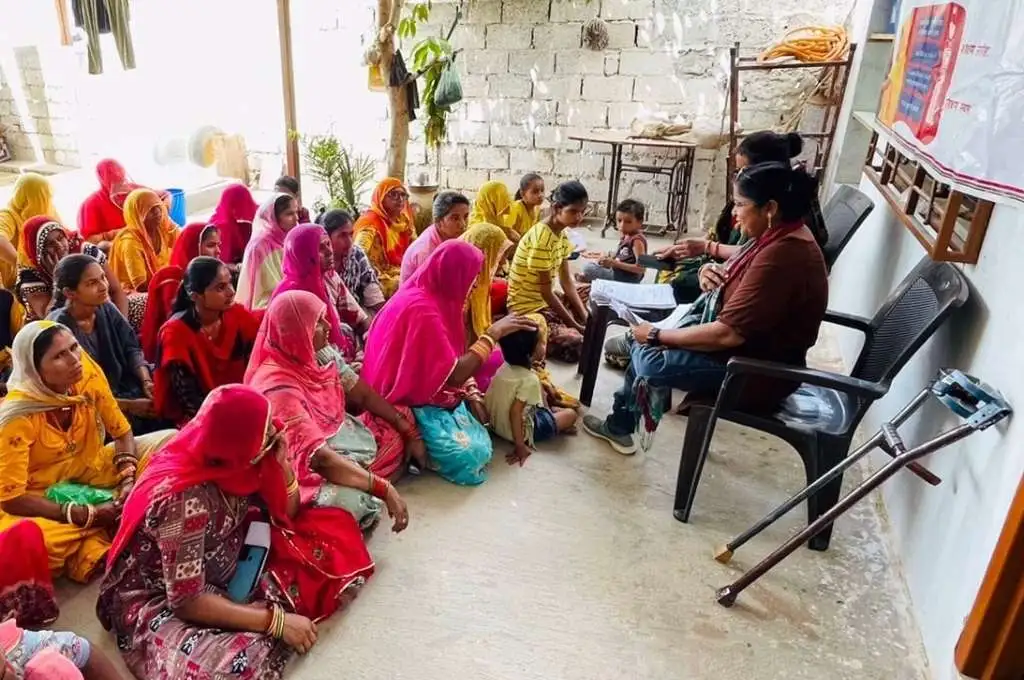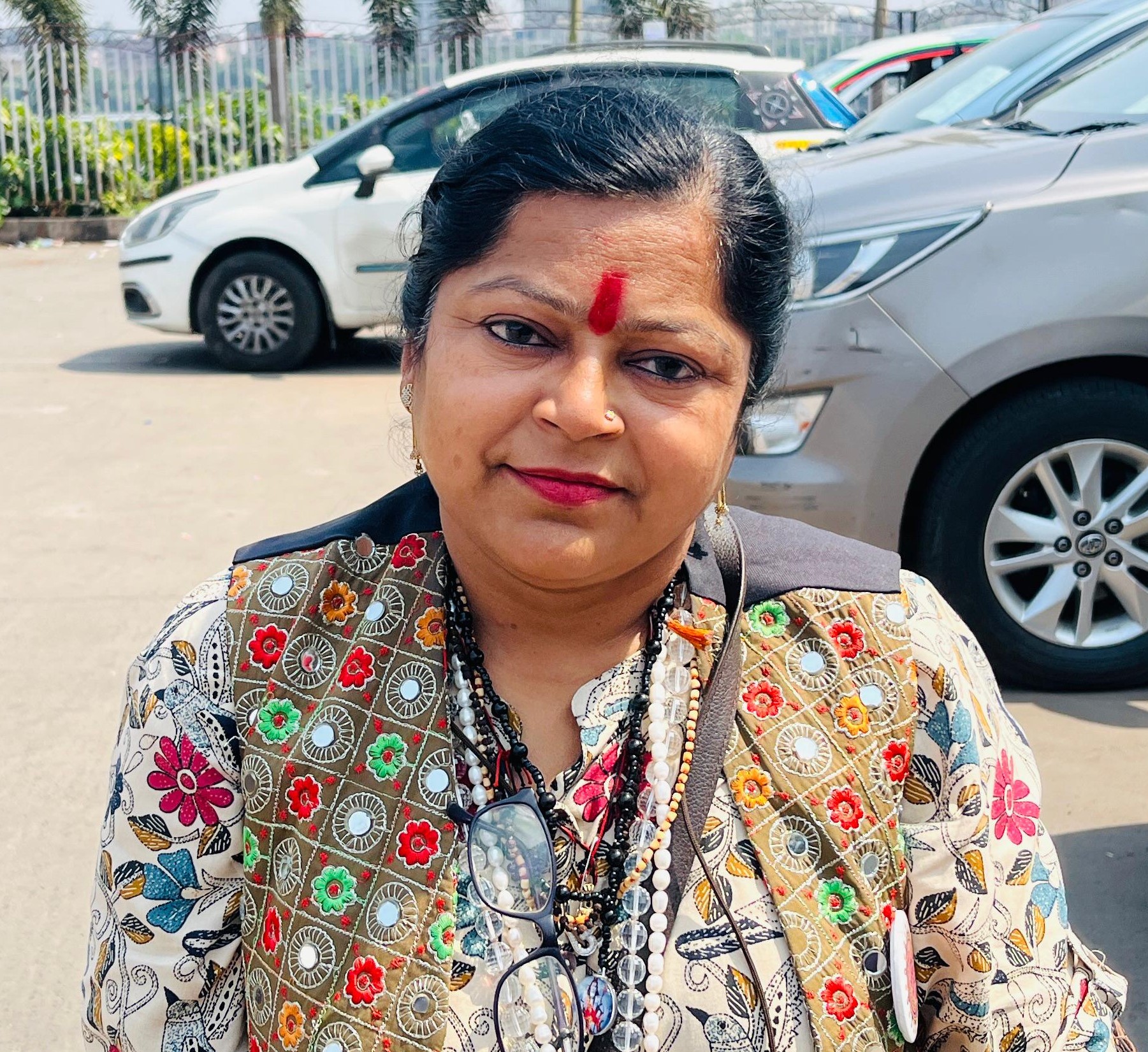माझे नाव पप्पु कंवर आहे आणि मी राजस्थानच्या बाडमेर येथे समाज सेवक आणि कार्यकर्ती म्हणून काम करत आहे. बाडमेर हा सामाजिकदृष्ट्या मागासलेला भाग आहे, जिथे जातीयवाद आणि महिलांवरील हिंसाचार मोठ्या प्रमाणात पसरलेला आहे, त्यामुळे विशेषतः येथे काम करणे कठीण होते. गेल्या काही वर्षांपासून, अनेक आव्हानांना सामोरे जात मी महिलांचे हक्क आणि विकलांगांच्या हक्कांसाठी काम करण्यात स्वतःला समर्पित केले आहे. या क्षेत्रात काहीतरी करुन दाखवण्याचा माझा मानस आहे.
यासाठी मी ‘आस्था महिला संघटना’ नावाची महिला संघटना स्थापन केली, ज्यात 250 हून अधिक महिला आहेत. आम्ही संघटनेचा एक भाग म्हणून महिलांचे गट तयार केले आहेत आणि एकत्रितपणे आम्ही आर्थिक आणि सामाजिक आव्हानांचा सामना करतो, भविष्यात ज्या समस्यांना कुटुंबांना तोंड द्यावे लागू शकते त्या समस्यांना त्या उद्भवण्यापूर्वी सामोरे जातात. स्थानिक समस्या सोडवण्यात आणि तणाव कमी करण्यात महिला आता महत्त्वाची भूमिका बजावतात. उदाहरणार्थ, अलीकडच्या एका प्रकरणात, एक मद्यधुंद माणूस त्याच्या पत्नीला आणि त्याच्या आईला इजा पोचवणार होता. आम्ही पोलिसांना बोलावले, आणि त्यांनी वेळेवर हस्तक्षेप केला. अनेक समस्या आम्ही स्वतः हाताळत असलो तरी गंभीर परिस्थितीत पोलिसांचा सहभाग महत्त्वाचा असतो. हा समूह ग्रामीण बाडमेर आणि त्याच्या आसपासच्या भागात सक्रिय आहे.
2003 पासून, मी जिल्हा दिव्यांग हक्क मंचात देखील सहभागी झाले आहे, ज्यामुळे दिव्यांग समुदायाचा जिल्हा आणि राज्य स्तरावर आवाज उठवण्यास मदत झाली आहे. ही संस्था दिव्यांग लोकांना बस आणि रेल्वे पास यासारखी आवश्यक कागदपत्रे मिळविण्यात मदत करते.
मला स्वतःला एक शारीरिक विकलांगत्व आहे, ज्यामुळे विकलांग व्यक्तींच्या हक्कांसाठीच्या माझ्या लढ्याला अधिक बळ मिळते.
सकाळी 6.00: वाजता जेव्हा मी उठते, तेव्हा पहिली गोष्ट जी मी करते ती म्हणजे एका चांगल्या दिवसासाठी देवाची प्रार्थना करणे. जर मी आदल्या रात्री आजच्या दिवसाचे वेळापत्रक तयार केले नसेल, तर मी ते सकाळी करते. तयार झाल्यानंतर आणि माझी घरगुती कामे संपवल्यानंतर, मी सामान्यतः बाडमेरच्या आसपासच्या क्षेत्रात जाते, सरकारी हक्क मिळण्यास विलंब होत असलेल्या लोकांना, घरगुती हिंसाचाराला सामोरे जावे लागणाऱ्यांना व समाजातून बहिष्कृत झालेल्या विधवा महिलांना भेटते. लोकांच्या समस्यांची यादी कधीही न संपणारी आहे.
मी 2002 पासून बाडमेरमधील विकलांग समुदायासोबत काम करत आहे. त्यांना संघटित करणे, त्यांच्या समस्यांविषयी जागरूकता वाढवणे आणि त्यांना निवृत्तीवेतन, विकलांगत्व प्रमाणपत्रे आणि इतर सरकारी हक्क मिळविण्यात मदत करणे.
सुरुवातीला, आपल्याकडे बघण्याचा समाजाचा दृष्टिकोन कसा असेल या भीतीने लोक एकत्र येण्यास संकोच करत होते. अनेक विकलांग नसलेले लोक आमच्याकडे बघत असत आणि अप्रिय टिप्पण्या करत असत. पण जसे आम्ही भेटू लागलो आणि त्यांच्या हक्कांसाठी भांडू लागलो, तसे आम्ही समाजाच्या नजरेकडे दुर्लक्ष करू लागलो. आता इतर लोक काय म्हणतील याची भीती न बाळगता आम्ही उघडपणे एकमेकांना अभिवादन करतो, आमच्या समस्या सांगतो आणि एकमेकांना पाठिंबाही देतो.
हा एक प्रदीर्घ प्रवास आहे. 1997 साली, मला चालायला मदत व्हावी म्हणून मी एका शस्त्रक्रियेला सामोरी गेले . या शस्त्रक्रियेनंतर मला पूर्णपणे एकट्याने कसे चालायचे हे शिकायला एक वर्ष लागले. विश्वासही बसणार नाही इतके हे कठीण होते. पण माझी आई नेहमी म्हणायची, “तू हे करू शकतेस, हार मानू नकोस!” लोकांना जे हवे ते म्हणू द्या; आम्ही तुझी ताकद आहोत.” तिच्या शब्दांनी मला पुढे जात राहण्याची ताकद दिली आणि मला हे समजण्यास मदत केली की, माझ्यासारखेच इतरांना देखील अशाच संघर्षाला सामोरे जावे लागते आणि लोक काय, काहीही बोलतात परंतु याची पर्वा न करता आपण पुढे जात राहिले पाहिजे.
मी चालायला शिकल्यानंतर, 2003 मध्ये मी एस. टी. डी. बूथवर काम करण्यास सुरुवात केली. सुरुवातीला, मला माझ्या कुटुंबाबाहेरील लोकांशी अगदी मूलभूत संभाषण कसे करावे हे देखील माहित नव्हते, परंतु कालांतराने, ही संभाषणकला मी कामावर असताना ऐकून आणि बोलून आत्मसात केली. लोकांनी त्यांच्या समस्या माझ्यासमोर व्यक्त केल्या, ज्यामुळे मला जाणीव झाली की मी समाजासाठी काही प्रमाणात योगदान देऊ शकते. मी विचार केला, “जरी या लोकांसाठी मी जास्त काही करू शकत नसले तरी मी त्यांना किमान मूलभूत साक्षर तर बनवू शकते.” वाचनाला मोठे महत्त्व आहे – ते लोकांना हे जग नेव्हिगेट करण्यास मदत करते.
मी समाजातील महिलांना विचारले की त्यांना वाचायला शिकायचे आहे का, आणि त्या शिकण्यासाठी उत्साही होत्या. अनेक महिलांना अभ्यास करायचा असतो, पण विविध कारणांमुळे त्यांना परवानगी दिली जात नाही. म्हणून, मी 2005 मध्ये एक साक्षरता मोहिम सुरू केली, ज्यामध्ये एका वेळी 10-15 महिलांना मूलभूत वाचन कौशल्ये शिकवली गेली. केवळ 15 दिवसांत मी त्यांना मूलभूत वाचन कौशल्ये शिकवू शकले आणि कालांतराने मी सुमारे 100 महिलांना वाचायला शिकण्यास मदत केली. या यशामुळे मला महिलांचे उत्पन्न आणि कमाईची क्षमता सुधारण्यावर लक्ष केंद्रित करण्याची प्रेरणा मिळाली. मी त्यांना शिवणकाम शिकवायला सुरुवात केली व शिवणकामाचे मोफत धडे देऊ लागले. मी महिलांच्या चार गटांना प्रशिक्षण दिले आहे आणि जरी त्यांना रात्री उशिरा मदतीची गरज भासली तरी मी त्यांच्यासाठी तिथे असण्याचा आणि त्यांच्या गरजांना प्राधान्य देण्याचा प्रयत्न करते. आज, यापैकी अनेक महिलांनी छोटी शिवणकाम केंद्रे उघडली आहेत किंवा दुकानांमध्ये काम करून त्या उदरनिर्वाह करत आहेत, या गोष्टीचा मला फार आनंद होतो.

दुपारी 1.00: वाजता मी सहसा दुपारी 1 च्या सुमारास जेवणासाठी विश्रांती घेते. माझे काम माझ्या वेळापत्रकानुसार दिवसागणिक बदलत असले तरी, दुपारच्या जेवणानंतर, मी बहुतेकदा उर्वरित दुपार – महिला गटांना भेटणे किंवा हक्कांशी संबंधित समस्या सोडवण्यात घालवते.
या क्षेत्रात आपल्याला भेडसावणाऱ्या समस्यांची अनेक रूपे आहेत. उदाहरणार्थ, काही वर्षांपूर्वी, माझ्या शेजारच्या खराब रस्त्यांमुळे मला अनेक समस्यांचा सामना करावा लागला. माझी तीन चाकी गाडी या रस्त्यावर सुरळीत चालत नसे. आणि दररोज कामानंतर येताना मला खराब रस्ता पार करण्यात मदत करण्यासाठी माझ्या आईला फोन करावा लागत असे. माझी आई आणि इतर एक-दोन स्त्रिया मला घरी नेण्यासाठी यायच्या. परिसरातील प्रत्येक विकलांग व्यक्तीला या समस्येचा सामना करावा लागला, परंतु ते सर्व यावर कारवाई करण्यास घाबरत होते. एके दिवशी, आम्ही आठ जण एकत्र जमलो आणि आमच्या प्रभाग सदस्याकडे गेलो. आमच्या सामूहिक आवाज उठवण्यामुळे, 10-15 दिवसांच्या आत रस्ता पुन्हा बांधण्यात आला.
गेल्या काही वर्षांत आम्ही एकत्र येउन एक मजबूत ’नेटवर्क’ तयार केले आहे आणि आता सरकारी अधिकारी आणि पोलीसही आमच्यासोबत काम करतात. सुरुवातीला, आम्हाला समस्यांचे निराकरण कसे करावे हे माहित नव्हते, परंतु हळू हळू आम्ही एक प्रणाली विकसित केली. जेव्हा जेव्हा एखादी नवीन सरकारी योजना येते, तेव्हा आम्ही ती माहिती त्वरित आमच्या व्हॉटसअप गटांमध्ये सामायिक करतो.
जात किंवा वर्गाच्या आधारावर भेदभाव न करता आम्ही सर्व समुदायांसोबत काम करतो, आणि आमच्याकडुन यात कोणतीही तडजोड केली जात नाही. आपल्या सभोवतालची असहिष्णुता कमी करण्यावर आमचे लक्ष केंद्रित आहे, कारण सामाजिक बदलासाठी लोकांनी एकत्र काम केले नाही तर कोणताही आर्थिक किंवा उपजीविकेचा प्रश्न कधीही सोडवला जाणार नाही. आम्ही ज्या महिलांसोबत काम करतो त्यापैकी अनेक महिलांना हे समजते आणि त्या जातीवादी प्रथांपासून दूर जाण्याचा प्रयत्न करत आहेत. उदाहरणार्थ, आता महिला गट एकत्र जेवतात, ज्याची यापूर्वी कल्पनाही केली जाऊ शकत नव्हती, कारण बाडमेरमध्ये जाती-आधारित भेदभाव केला जात होता. आणि हा बदल मी प्रत्यक्ष पाहिला आहे.

दुपारी 4.00: च्या सुमारास जसजसा दिवस संपत येतो, तसा मी काही प्रशासकीय कामे करण्यासाठी कार्यालयात जाते, आवश्यकता असलेली बिले भरण्याची प्रक्रिया करते आणि विविध प्रशिक्षणास उपस्थित राहते किंवा विविध विषयांवर प्रशिक्षण देते.
जेव्हा कोरो इंडिया मध्ये मी एक सहकारी होते तेव्हा, लोक अभियान तर्फे आयोजित, अनेक प्रशिक्षणांमध्ये मी भाग घेतला, ज्यात घटनात्मक मूल्ये आणि अधिकारांच्या प्रशिक्षणांचा देखिल समावेश आहे (आम्ही, लोक अभियान). यामुळे मला महिला आणि दिव्यांग व्यक्तींच्या हक्कांसाठी आणि आधिकारांसाठी कसे लढावे याबद्दलची माझी समज सुधारण्यास मदत झाली. डिजिटल एम्पावरमेंट फाउंडेशन यांच्या डिजिटल सार्थक या कार्यक्रमाने मला डिजिटल तंत्रज्ञानाचा चांगल्या पध्दतीने वापर करण्यास देखील सक्षम केले.
मी विजेची बिले भरण्यासाठी आणि सरकारी योजनांकरिता नोंदणी करण्यासाठी, अर्ज भरण्यासाठी संगणक आणि स्मार्टफोनचा वापर करण्यास सुरुवात केली आणि अखेरीस समाजातील अनेक महिलांना यापैकी काही डिजिटल कौशल्यांचे प्रशिक्षण दिले. आता, परिसरातील अनेक महिला फोन वापरू शकतात आणि काही त्यांच्या छोट्या व्यवसायांना प्रोत्साहन देण्यासाठी व्हॉटसअप, इन्स्टाग्राम आणि यूट्यूब सारख्या सोशल मीडियाचा वापर करतात, तर इतर व्हिडिओ पाहून स्वयंपाक करण्यासारखी नवीन कौशल्ये शिकतात.
माझ्या कामाचा अत्यंत आवश्यक आणि सर्वात कठीण भाग म्हणजे विकलांग लोकांना मदत करणे, कारण पर्यायांबद्दल जागरूकता नसल्यामुळे अनेकजण पूर्णपणे त्यांच्या कुटुंबावर अवलंबून असतात. मंचाचा एक सदस्य एकट्याने पुढे जाऊ शकत नव्हता आणि त्याला सतत काळजी घेण्याची आवश्यकता होती.
आम्ही त्याला पुनर्वसन केंद्रात नेले, जिथे तो संगणक कौशल्ये सहजपणे शिकला, कारण तो खूप हुशार आहे. आता, तो या कौशल्यांचा वापर आर्थिकदृष्ट्या स्वावलंबी होण्यासाठी करत आहे. हा अनुभव आपल्याला आशा देतो की योग्य पाठबळ आणि संधी मिळाली तर अधिकाधिक लोकांचे जीवन बदलले जाऊ शकते.
सायंकाळी 7.00: वाजता मी सहसा घरी पोहोचते, असे ही काही दिवस असतात जेव्हा मी खूप उशिरा पोहोचते. दररोज रात्री मी माझ्या दिवसभरच्या कामाचा आढावा घेण्यासाठी वेळ काढते. काय चांगले झाले आणि काय झाले नाही यावर मी विचार करते, माझ्या रोजनिशी मध्ये माझे विचार नोंदवते.
यामुळे मला माझ्या प्रगतीचे मूल्यांकन करण्यास आणि दुसऱ्या दिवसाचे नियोजन करण्यास मदत होते. माझी उद्दिष्टे आणि काय साध्य करणे आवश्यक आहे याची जाणीव ठेवणे माझ्यासाठी महत्त्वाचे आहे. माझ्या मोकळ्या वेळेत मला भजन ऐकायला आवडते.
माझ्या कामाच्या सुरुवातीच्या काळात मला लोकांकडून खूप अविश्वास मिळाला , विशेषतः कारण मी एक विकलांग स्त्री आहे. लोक नेहमी म्हणत असत, “ती काय करू शकते? ती विकलांग आहे.” दुर्दैवाने, हे एक वास्तव आहे ज्याचा आमच्यापैकी अनेकांना दररोज सामना करावा लागतो. पण, मी त्या टिप्पण्यांकडे दुर्लक्ष करुन पुढे जाणे निवडले. माझ्या आईने एकदा मला आठवण करून दिली की सर्व बोटे समान आकाराची नसतात-प्रत्येकजण अद्वितीय असतो आणि त्याचा स्वतःचा प्रवास असतो. माझ्या क्षमतेवरील या विश्वासामुळे मला माझ्या कामात सातत्य राखण्याची ताकद मिळाली.
आय. डी. आर. ला सांगितल्याप्रमाणे.
मूळ इंग्रजीतील लेखाचा मराठी अनुवाद करताना ट्रांसलेशन टूल चा वापर केला आहे. प्रमोद सडोलीकर यांनी अनुवादीत लेख तपासण्याचे व संपादनाचे काम केले आणि अंकिता भातखंडेयांनी याचे पुनरावलोकन केले आहे.
—
अधिक जाणून घ्या
- अधिक वाचनासाठी भारतीय विकलांगत्व कायद्यावर असलेला हा प्रायमर.
- अधिक माहितीसाठी विकलांग महिलांना अत्याचाराचा धोका कसा जास्त असतो.
- जाणून घ्या कारण राजस्थानमध्ये दिव्यांगांसह लाखो निवृत्तीवेतनधारकांना त्यांचे निवृत्तीवेतन नाकारले जात आहे.






